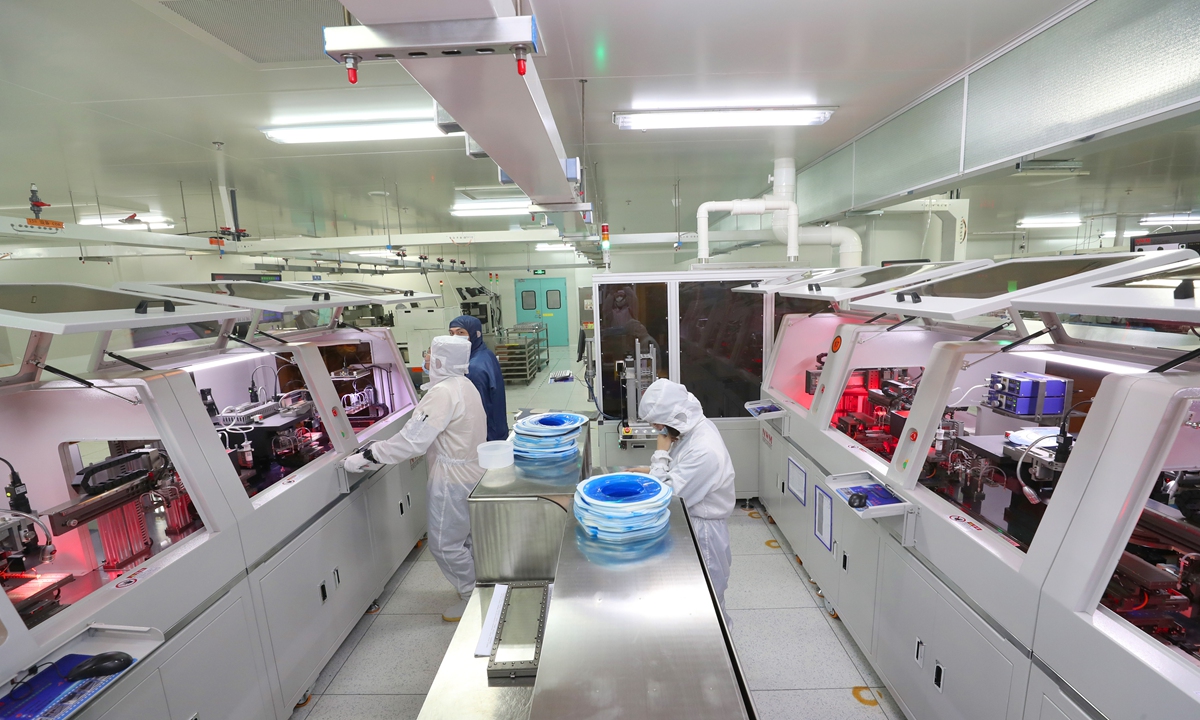
Staff members work at a semiconductor manufacturing workshop in Nantong, East China's Jiangsu Province in March Photo: cnsphoto
China has filed a lawsuit against Japan over its semiconductor export control measures, as Chinese representatives at the World Trade Organization (WTO) requested a review of the US-led restrictive agreement with its allies to contain China's semiconductor industry.
The latest move demonstrated China's resolve to safeguard its legitimate rights based on international rules, and to maintain the stability of industrial supply chains in the world, experts said.
China is highly concerned about Japan's semiconductor export controls and urges it to rectify its actions, a spokesperson for the Chinese Ministry of Commerce (MOFCOM) said in a press release late Tuesday. China has filed the lawsuit with the WTO against Japan over the issue, and will take resolute measures to safeguard its legitimate rights, if the Japanese side insists on disrupting bilateral semiconductor cooperation, the spokesperson said.
"We hope that Japan will listen to reasonable voices at home, correct its wrong practices in a timely manner, promote the healthy development of economic and trade relations between the two countries, and work with all parties to maintain the stability of the global semiconductor industrial supply chain," the spokesperson noted.
Tokyo said on March 31 that it planned to restrict exports of 23 types of semiconductor manufacturing equipment, aligning its technology trade controls with the US' in order to hobble China's ability to make advanced chips.
The Japanese government is still seeking public input on the measures.
China is the world's largest semiconductor market and the largest export destination of Japan's semiconductor manufacturing equipment. The two countries used to be cooperative in both upstream and downstream of the industrial chain for a long time, according to MOFCOM.
Chinese representatives at the WTO on Tuesday urged the multilateral trade organization to scrutinize US-led technology export restrictions, China Central Television (CCTV) reported on Wednesday.
The representatives asked during a regular WTO meeting whether the widely reported export control agreement between the US, Japan and the Netherlands aimed at curbing China's ability to make advanced chips exists. To date, there has been no disclosure of the reported agreement in public.
"Relevant players may have realized that the agreement adamantly violates WTO rules, so they deliberately kept the content of the agreement low-profile," Chinese representatives said, according to CCTV.
China believes that the agreement violates the WTO's principle of openness and transparency, and undermines the authority and effectiveness of WTO rules, they said.
The representatives required the US, Japan, and the Netherlands to notify the WTO of the agreement and subsequent measures, and called on the WTO to strengthen scrutiny on those measures.
"China is not only defending its own legitimate rights within the WTO framework, but also striving to protect the global semiconductor industrial chain from the menace by the US-led political circle," Gao Lingyun, an expert at the Chinese Academy of Social Sciences in Beijing, told the Global Times on Wednesday.
China initiated a lawsuit against the US in WTO in December last year over its chip export control measures, requesting the WTO begin dispute consultations with the US.
The US Department of Commerce's Bureau of Industry and Security announced an extensive set of regulations in October last year, which restricted chips made using American tools from being exported to China. The Biden administration is also forcing other countries to contribute to its goal of undercutting China's ability to make advanced chips.
In addition to Japan's export control measures, Dutch Trade Minister Liesje Schreinemacher announced in early March export restrictions on the most advanced semiconductor technology, saying the new controls will be introduced before the summer this year. The move put the Netherlands in broad alignment with US.
"Actually, the negotiations are still ongoing. We do hope that the Dutch government will, to the extent possible, reduce or limit the scope of the export control. At the same time, they should abide by the contracts they have already signed," Ambassador Fu Cong, head of the Chinese Mission to the EU, said in an interview with the Financial Times on March 30.
The US-led political circle is trying to counter China's rise in the high-technology sector by putting curbs on chips, which is a clear violation of WTO rules of free trade, Gao said.
"For both Japan and the Netherlands, their plan to join the US is essentially an act of harming China under the coercion of a certain country. It puts the interests of their own businesses aside," he added.
In the US itself, the government's wide-reaching export control moves targeting China have backfired among American semiconductor producers.
By 2025, US companies could lose 18 percent of global market share and 37 percent of business revenues if the US government completely bans semiconductor companies from selling to Chinese customers, effectively causing a technology decoupling from China, according to a report by Boston Consulting Group.




